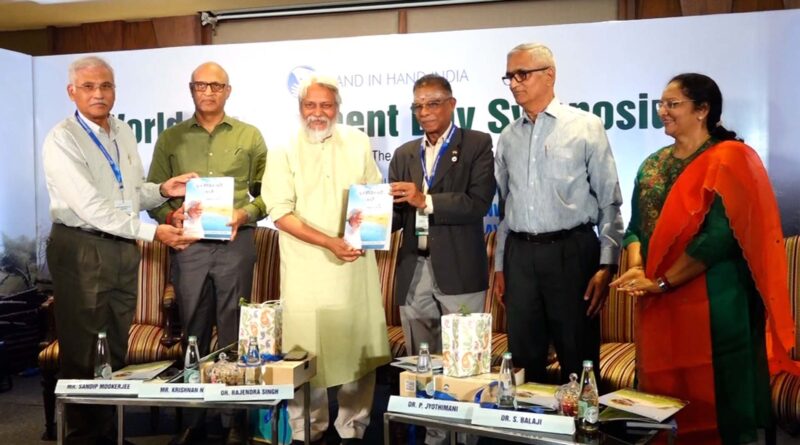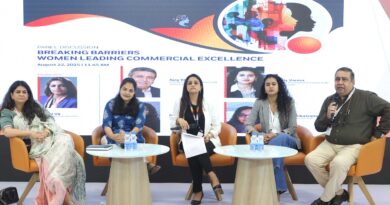Hand in Hand India’s World Environment Day Symposium in Chennai brings together experts from across the country
“Water Man of India” Dr. Rajendra Singh calls for concerted and concrete environmental protection efforts from stakeholders for sustainable future
Chennai: Hand in Hand India (HiHI), a not-for-profit public charitable trust working towards poverty alleviation through job creation since 2004, organised the World Environment Day Symposium, in Chennai on Monday (June 3, 2024).
The event that saw the participation of stakeholders from across the country provided a platform for leading environmental experts, academics, corporates, and policymakers to disseminate knowledge, discuss pertinent environmental challenges and collaborate on solutions for pressing environmental challenges. The symposium was attended by 100 participants across corporates, NGOs, institutions and other stakeholders.
This event was part of HiHI’s ongoing efforts to promote environmental sustainability and raise awareness about critical ecological issues. Keeping in line with the United Nations theme this year – “Land restoration, desertification and drought resilience”, the official slogan for the symposium was “Our Land, Our Future. We are #GenerationRestoration” – as declared by the United Nations.
Cities globally are facing the increased effects of climate change. Greater Chennai Corporation through the support of C40 Cities and Uppsala Monitoring Centre has drafted a Climate Action Plan for Chennai aligned to the Paris Agreement. A panel discussion on the same engaged experts in navigating this initiative.
In his address, noted water conservationist and environmentalist Dr. Rajendra Singh, better known as the “Waterman of India” and winner of prestigious accolades such as the Ramon Magsaysay Award, Jamnalal Bajaj Award, and the Stockholm Water Prize, called for concerted and concrete environmental protection efforts from stakeholders for sustainable future.
He said “The solution to the water crisis is community-driven, decentralized water management. Water crisis is a global problem but the solution is local. Modern science has to incorporate indigenous knowledge systems, along with common sense. Is economic growth worth more than happiness, dignity and our way of life? Learn the principles of sustainable development from our history and culture.”
He also spoke passionately about the importance of adopting local and indigenous solutions to address the devastating water crisis. He emphasized the importance of decentralized, natural resource management. He noted that greed and overconsumption are the root causes of the climate crisis we face. “It is about time that we assimilate ancient wisdom, technologies and engineering to revive and recharge local water bodies, before it is too late”. He explained the methods he has employed in his home state of Rajasthan to revive more than 27 rivers.
Chief guest of the event, Justice Dr. P. Jyothimani, former Judicial Member – National Green Tribunal and former Judge – Madras High Court, said, “Development and sustainability must go hand in hand. All life deserves respect, including plants and animals. Plants and animals are more sensitive than humans. We need to go to children, go to schools and teach them the importance of waste segregation, water and environmental conservation. We have to target children to ensure change.” He also mentioned that “Climate change is a global issue and there is a lack of worldwide involvement. Even Tamil Nadu is lagging behind in solid waste management and waste segregation. Regulatory interventions are not adequate; ground level awareness is critical.”
Dr. Kalpanaa Sankar, Chairperson, Hand in Hand India, said, “We have to act before water becomes a luxury. Conservation and sustainability are not rocket science; there is an urgent need for discipline, use of community wisdom and farmer awareness. Let us strive to keep the environment around us clean”.
Dr. Sankar reiterated that excessive greed and overconsumption are the root causes of the climate crisis. She also stated that “India has abundant natural resources; yet, as a result of our massive population, we are struggling to cope. We have to learn from countries like Sweden, a developed nation with a small population, where they actively choose public transportation, and are careful about water and electricity usage. We have to train and urge farmers to switch from solely growing cash-rich crops to adopting sustainable crop choices which are linked to rain patterns”.
Dr. Kshithij Urs, Executive Director, India Biochar and Bioresources Network, Bengaluru; Dr. Pravakar Mishra, Scientist (Retd.), National Centre for Coastal Research of the Ministry of Earth Sciences; Dr. N. Barathi, Scientist & Entrepreneur, GROWMORE BIOTECH, Hosur; Dr. Indumathi Nambi, IIT Madras; Dr. Kandasamy Palanivelu, Anna University (Retd.); Dr. Janakarajan, Madras Institute of Development Studies; Dr. Balaji Srinivasagopalan, IFS; and Dr. Jayshree Vencatesan, Managing Trustee, Care Earth were part of the panels and discussions.
Hand in Hand India works in multiple domains like women empowerment & job creation, child labour elimination & education, affordable access to healthcare, skill development, environment – solid waste & natural resource management and village upliftment. It has successfully implemented several projects in 20 states across India.




